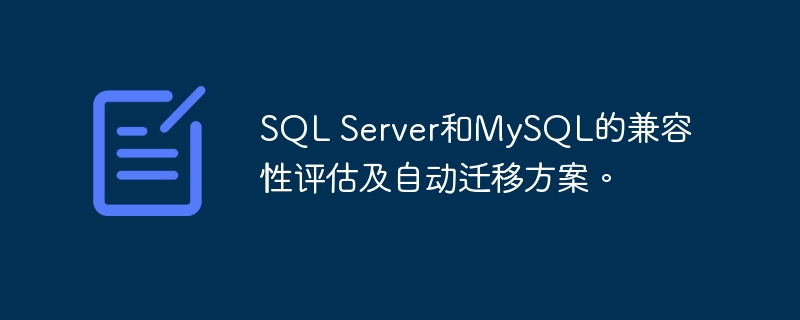Home >Database >Mysql Tutorial >Compatibility assessment and automatic migration solution for SQL Server and MySQL.
Compatibility assessment and automatic migration solution for SQL Server and MySQL.
- WBOYWBOYWBOYWBOYWBOYWBOYWBOYWBOYWBOYWBOYWBOYWBOYWBOriginal
- 2023-09-09 17:54:371433browse

SQL Server and MySQL are two commonly used relational database management systems. In actual applications, you may encounter the need to migrate SQL Server to MySQL. In order to ensure the smooth progress of the migration, it is necessary to evaluate the compatibility of the two databases and find a suitable automatic migration solution.
First, let’s evaluate the compatibility between SQL Server and MySQL. There are some differences between SQL Server and MySQL in terms of syntax, data types, functions, and stored procedures. Before migrating, you need to understand these differences and make appropriate modifications to the existing SQL Server code to ensure that it can run properly on MySQL.
In terms of syntax, SQL Server uses T-SQL language, while MySQL uses standard SQL language. This means that some syntax in SQL Server may not be recognized or written differently in MySQL. For example, SQL Server uses the TOP keyword to limit the number of rows in query results, while MySQL uses the LIMIT keyword to achieve the same function.
In terms of data types, there are some differences in the data types supported by SQL Server and MySQL. For example, SQL Server supports the datetime and smalldatetime types, while MySQL supports the datetime and timestamp types. When migrating, attention needs to be paid to appropriately converting data types to ensure data consistency.
In terms of functions, there are also some differences in the functions supported by SQL Server and MySQL. For example, SQL Server uses the GETDATE() function to get the current date and time, while MySQL uses the NOW() function to achieve the same functionality. When migrating, you need to convert the functions used in SQL Server into functions supported by MySQL.
There are also some differences between SQL Server and MySQL when it comes to stored procedures. SQL Server uses stored procedures to implement complex business logic, while MySQL uses stored procedures to improve database performance. When migrating, stored procedures need to be rewritten to adapt to the syntax and features of MySQL.
In summary, there are some compatibility differences between SQL Server and MySQL, which require appropriate modifications and adjustments to the existing SQL Server code. To simplify the migration process, we can try using automatic migration tools.
Based on my experience, I recommend using the automatic migration tool DataGrip from SQL Server to MySQL. It is a database development tool developed by JetBrains and supports the migration and management of multiple databases. The following is a sample code that demonstrates how to use DataGrip for automatic migration from SQL Server to MySQL:
-- 在DataGrip中创建一个新的MySQL连接 -- 选择要迁移的SQL Server数据库,右键单击,选择"导出" -> "向MySQL导出" -- 在导出向导中,输入MySQL连接的详细信息,例如主机名和凭据 -- 选择要执行的任务,例如表、视图、函数和存储过程的迁移 -- 点击"下一步",DataGrip将自动生成迁移脚本并将数据从SQL Server导入到MySQL -- 在迁移完成后,可以在MySQL中验证数据的准确性和完整性 -- 在迁移过程中,可能会出现一些错误和警告,需要进行适当的调整 -- DataGrip提供了丰富的工具和功能,以帮助我们解决这些问题 -- 完成了SQL Server到MySQL的自动迁移,可以开始在MySQL上正常运行应用程序了
When using the automatic migration tool for migration, it is recommended to test and debug in the test environment first to ensure the migration is smooth. Goes smoothly. At the same time, you also need to pay attention to backing up the SQL Server database to prevent data loss or damage.
In short, there are some compatibility differences between SQL Server and MySQL, which require appropriate modifications and adjustments to the existing SQL Server code. Using automatic migration tools can simplify the migration process and improve migration efficiency and accuracy. However, when using automatic migration tools, you need to pay attention to handling possible errors and warnings, and conduct experiments and debugging in a test environment.
The above is the detailed content of Compatibility assessment and automatic migration solution for SQL Server and MySQL.. For more information, please follow other related articles on the PHP Chinese website!

